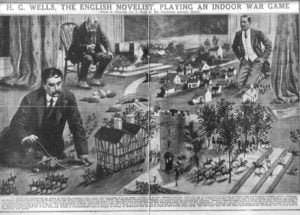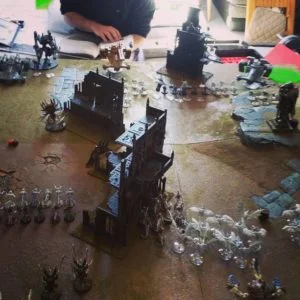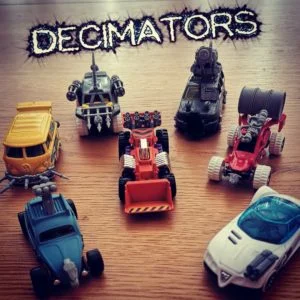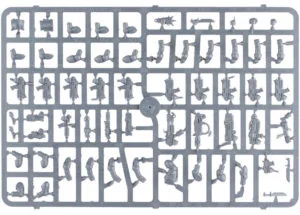In the grim darkness of the far future there is only……lots of plastic/super glue, paints and dice all over the place! In today’s post I’m going to be talking about tabletop miniature war gaming. The name is quite descriptive of what they are – you use miniatures on a tabletop to play games of war against each other. This is often done by carefully measuring distances, using dice to represent the probability of things hitting or dodging being hit.
Miniature wargaming has been a form of play for many, many years. It most likely began as an offshoot of using miniatures to represent units in strategy meetings for battles and it is where we get games like chess and shogi from. There was a set of rules created in 1826 called Kriegspiel which was very rules heavy and dry and was used to train people for strategizing in real wars.

One of the earliest rulebooks explaining how to use miniatures for fun war gaming, rather than strategising, actually comes from the author H.G. Wells. He used to build model soldiers with his friends as a pastime and then act out mock battles with them. Realising how much fun this was they wrote up rules for a game called ‘Little Wars: a game for boys from twelve years of age to one hundred and fifty and for that more intelligent sort of girl who likes boys’ games and books.’ which is quite the title. The book’s first sentence defines it even further:
“LITTLE WARS” is the game of kings—for players in an inferior social position. It can be played by boys of every age from twelve to one hundred and fifty—and even later if the limbs remain sufficiently supple—by girls of the better sort, and by a few rare and gifted women- H.G. Wells, Little Wars.
It used what would become the staples of wargaming from then on. Units would only be able to move a set distance based on what type they were, and there were different rules for shooting and for hand to hand combat. You can read the full book here if you wish.

Since then wargaming has evolved into a massive business worldwide. Millions of people collect all manner of plastic, resin and metal figurines that they can put together, paint up and take to battle. They cover almost every genre you can think of. Sci Fi, Fantasy, Star Wars, space battles, land battles, sea battles, modern day warfare, ancient times, monsters, World Wars, colonial times….Killer football, post apocalyptic death races….you name it and there is probably a wargame out there catering to it. In all of them the various units will have different ‘points costs’ to show how valuable they are in battle, and you will set limits on how many points are allowed so competing armies are evenly matched.

The games have also led to a huge array of fiction being written set in the universes. They really spark the imagination of those playing them and many books have been published, so many games have lots of complex ‘lore’ surrounding them – lore being the fictional history of a game.
Parental Warning
This is not a cheap hobby. There are some games out there that are cheaper than others, but you will usually be looking at around £50 minimum spend to start on a new wargame and thats not including the glue and paint you need for it. There are then other units to buy to make the army you wish and they can vary in price from £3 to over £1000 (I’m not kidding)

Also the models usually come unmade and unpainted. They will require glue and paints to make them, so ensure you have an area that you don’t mind getting paint and superglue splatters on. I built myself a small painting and gluing station to use for this. They also come attached in ‘sprues’ of figures, so you have to remove them safely, usually using sharp blades and files. For starter sets many companies try to make them easy to build, but you still come across this issue so parental guidance is recommended.

Questions to explore character:
There are lots of potential questions that can be tailored to each game, however all of the games utilise randomness, strategy and luck. Also I am using the term army as a catch all, it could just be a single squad, or a type of unit.
- Why did you pick your army? How does your army choice reflect you in real life?
- What strategy does your army use? (this will fall broadly into close combat, staying back and shooting, speed or number of units) What drew you to that strategy?
- How do you prepare for a match?
- How does it feel when one of your plans doesn’t work? Do you ever feel this way about things other than the game?
- Can I join you for a game?

Links to Faith
The bible has many accounts of various wars which you could use wargaming to talk about. However I am going to focus on something Jesus said in this link:
28 “But don’t begin until you count the cost.[a]For who would begin construction of a building without first getting estimates and then checking to see if he has enough money to pay the bills?29 Otherwise he might complete only the foundation before running out of funds. And then how everyone would laugh!
30 “‘See that fellow there?’ they would mock. ‘He started that building and ran out of money before it was finished!’
31 “Or what king would ever dream of going to war without first sitting down with his counselors and discussing whether his army of 10,000 is strong enough to defeat the 20,000 men who are marching against him?
32 “If the decision is negative, then while the enemy troops are still far away, he will send a truce team to discuss terms of peace.33 So no one can become my disciple unless he first sits down and counts his blessings—and then renounces them all for me. – Luke 14:28-33
In this Jesus is telling us that we should always prepare before doing things. The same is true in the wargames. If you just choose an army at random not bothering to see if it matches up in points the army your opponent has then chances are you won’t get very far and your opponent will beat you, you need to have a strategy of how you will approach things. This is true of many things in life, we should always try our best to plan ahead when we can to ensure that we are ready for what is to come.
The final sentence is the most important part of what Jesus is saying here. We should count our blessings, all the things we have that is good in the world, and acknowledge that they don;t matter compared to having a relationship with Him. We don’t need to give them up, just realise that Jesus is the way to happiness and eternal life, not things.
Suggested Games
Reminder, all Amazon links from this point on (including pictures) are Amazon Affiliate links and will provide me with a slight commission. For more information check the Disclosure page.
The most well known is probably Warhammer, many high streets in the UK have a Games Workshop store somewhere in them, with a window filled with science fiction (Warhammer 40000) or fantasy (Age of Sigmar) models that are crafted and painted to a very high standard.
These have you pit large armies against one another….and as such are very expensive. A typical squad of your chosen army will set you back between £15 and £20, and in order to play you need at least 2 squads and a commander.
Gaslands is currently my favourite wargame setting. It is a post apocalypse death race where cars race to the finish line whilst trying to wreck each other. Part of why I like it so much is it’s so cheap. All you need is the rulebook, a small handful of scenery (which can be represented by books and household objects) and some hot wheel cars. So £3 can get you the army you need. The creator is constantly writing new content as well so it will last a good long while.


Dropzone Commander/Dropfleet Commander use very small scale models to represent futuristic tank/mech battles and space battles respectively. I love the combat system for this one, you can decide not to shoot or move and that allows you to react to other players movement and you can destroy the scenery to change the layout of the battle. Also the starter set for dropzone comes with some great cardboard scenery you can use to make it feel really urban and cramped.
Infinity has you controlling a single squad as opposed to a whole army, and relies heavily on the scenery you are using to provide corridors, corners and line of sight for reactions. It leads to a tense and fast paced battle. The models are fantastic as well.
Guild Ball is American Football with a heavy side of death and destruction. This game sees you trying to get the ball from one side of the table to the other by any means necessary. The ‘armies’ in this one are all based on traditional workers ‘guilds’ so you have the fishers, the masons, the blacksmiths etc. Each faction bringing its own style of ‘football’ with them.
Star Wars Legion lets you play as the Imperials or Rebels in this squad based game, you have individual characters that you control at random – their tiles are in a bag and you only know which unit is going to move next when you pull the corresponding token out of the bag. It is apparently a solid game, but you need at least 8 characters per side for the mechanics to really work – the starter set comes with 4 for each.
There are many, many more wargames out there, and I do recommend people find one that they like as they are good fun. Its often worth building up 2 armies as well so then people who don;t have the game themselves can play against you.







